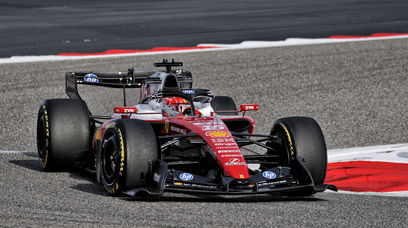Jolyon Palmer has explained how Mercedes seem to capitalise from Ferrari's struggles with strategy in "dynamic" race situations. The Hungarian Grand Prix proved to be a day of mixed fortunes for the two teams. While the Silver Arrows scored their second consecutive double podium thanks to Lewis Hamilton and George Russell finishing in P2 and P3, Carlos Sainz and Charles Leclerc slipped from second and third on the grid to P4 and P6 respectively. This was down to problems at pit-stops and strategy errors from the Scuderia, particularly in the case of Leclerc, who struggled after being fitted with Hard tyres at his second stop. With the compound proving difficult to warm up, Leclerc was eventually brought in again to switch to the Soft tyres, dropping him down to sixth. The race results means that Mercedes have closed the gap to Ferrari in the Constructors' Championship to just 30 points, and Palmer believes that the latter team's strategy issues are the main reason for this. "[A key] benefit Mercedes have is Ferrari's tendency not to maximise their potential thanks to less-than-ideal strategy calls," Palmer wrote in his column for Formula1.com . "Again, Ferrari can blame their strategy for not picking up better results than a mere fourth and sixth in Budapest. Almost inexplicably, Leclerc finished behind both Red Bulls that started 10th and 11th."
Palmer reflects on Ferrari's "catastrophic" error
Palmer expects that Leclerc will be continuing to seek answers from Ferrari over their strategy choice, which may have cost him a victory. "Clearly, the Hard tyres were to be avoided for anyone not on a one-stop – and even then it wasn't the optimal choice," Palmer continued. "You could see the logic in what Ferrari did by pitting Leclerc this time – they wanted to protect the lead of the race from Verstappen's undercut and had to use either the Soft or Hard to satisfy the regulations. "Pitting at that point meant fitting the Hards, which ultimately was a catastrophic error. "Had Leclerc ceded track position and opted for the Sainz or Hamilton strategy of running Softs late on, he probably would have won the race, or certainly fought for victory at the very least. "It was another race win which evaded the Monegasque driver, and I'm sure he was seeking an explanation heading into the summer break."
Ferrari "hit trouble" in non-straightforward races, says Palmer
Palmer believes that Ferrari particularly struggle in changing race scenarios, a flaw that has led to the team losing points to their rivals. "When the strategy is straightforward Ferrari can handle it, but in a dynamic race situation as the Hungarian Grand Prix was, they seem to hit trouble and lose points to Red Bull and Mercedes," Palmer commented. "It all means that we head into the summer shutdown with [Max] Verstappen and Red Bull sailing away into the distance and Ferrari looking over their shoulders at Mercedes fast approaching, a feat you'd have struggled to believe after the way this season started."
Most read







